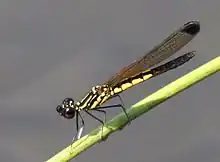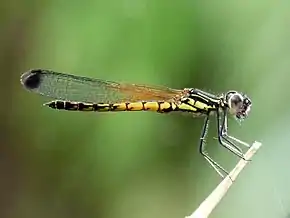Libellago
Libellago est un genre d'insectes odonates (libellules) du sous-ordre des Zygoptera (demoiselles) de la famille des Chlorocyphidae.
Dénomination
Le genre Libellago a été décrit par l'entomologiste français Edmond de Sélys Longchamps en 1840[3].
Description

Libellago lineata ♂
Les demoiselles du genre Libellago rappellent certaines libellules[3].
Le front est très proéminent en forme de protubérance ou de corne retournée en arrière[3].
Les ailes sont très étroites et pétiolées à la base et présentent un parastigma oblong. Les cellules des ailes sont assez grandes et un grand nombre est pentagonal[3].
L'abdomen est court et déprimé[3].
Les pattes sont courtes[3].
Publication originale
- Sélys Longchamps, E., de, 1840. Monographie des libellulidées d'Europe. Librairie Encyclopédique de Roret, Paris, 220 pages [200].
Taxinomie
- Libellago adami Fraser, 1939[6]
- Libellago andamanensis (Fraser, 1924)[7]
- Libellago asclepiades (Ris, 1916)
- Libellago aurantiaca (Sélys, 1859)
- Libellago balus Hämäläinen, 2002[7]
- Libellago blanda (Hagen, 1853)[7]
- Libellago celebensis van Tol, 2007[8]
- Libellago corbeti van der Poorten, 2009[9]
- Libellago daviesi van Tol, 2007[8]
- Libellago dorsocyana Lieftinck, 1937
- Libellago finalis (Hagen, 1869)
- Libellago greeni (Laidlaw, 1924)
- Libellago hyalina (Sélys, 1859)
- Libellago indica (Fraser, 1928)
- Libellago lineata (Burmeister, 1839)
- Libellago manganitu van Tol, 2007[8]
- Libellago naias Lieftinck, 1932[1]
- Libellago orri Dow & Hämäläinen, 2008
- Libellago phaethon (Laidlaw, 1931)
- Libellago rufescens (Sélys, 1873)
- Libellago semiopaca (Sélys, 1873)
- Libellago stictica (Sélys, 1869)
- Libellago stigmatizans (Sélys, 1869)
- Libellago sumatrana (Albarda, 1879)
- Libellago xanthocyana (Sélys, 1869)
Notes et références
- Lieftinck, M. 1932. Notes on the Genus Libellago Selys, with descriptions of two new species (Odon.). Konowia (Vienna), 11: 1-11.
- Steinmann, H. 1997. World catalog of Odonata. Volume I. Zygoptera. Walter de Gruyter, New York, 507 pages. (ISBN 3 11 014933 8).
- Sélys Longchamps, E., de, 1840. Monographie des libellulidées d'Europe. Librairie Encyclopédique de Roret, Paris, 220 pages [200]
- Schorr, M., Paulson, D. 2017. World Odonata List. Slater Museum of Natural History. University of Puget Sounds. Tacoma, Washington, États-Unis.
- (en) Référence Animal Diversity Web : Libellago (consulté le )
- Fraser, F. C. 1939. Libellago Adami, A New Species Of Dragonfly From Ceylon (Odonata). Systematic Entomology, 8(2): 23-24.
- Hämäläinen, M. 2002. Notes on the Libellago damselflies of the Andaman and Nicobar Islands, with description of a new species (Zygoptera: Chlorocyphidae). Odonatologica, 31(4): 345-358.
- van Tol, Jan. 2007. The Odonata of Sulawesi and adjacent islands. Part 7. Libellago and Sclerocypha (Chlorocyphidae). International Journal of Odonatology, 10: 209-248.
- van der Poorten, N. 2009. Libellago corbeti sp. nov. from Sri Lanka (Odonata: Chlorocyphidae). International Journal of Odonatology, 12: 223-230.
Liens externes
- (en) Référence Animal Diversity Web : Libellago (consulté le )
- (en) Référence BioLib : Libellago Sélys, 1840 (consulté le )
- (en) Référence Catalogue of Life : Libellago (consulté le )
- (fr+en) Référence EOL : Libellago (consulté le )
- (fr+en) Référence GBIF : Libellago Sélys, 1840 (consulté le )
- (en) Référence NCBI : Libellago Sélys (taxons inclus) (consulté le )
- (en) Référence The Taxonomicon : Libellago Sélys, 1840 (consulté le )
- (en) Référence uBio : Libellago Sélys, 1840 (consulté le )
- Portail de l’entomologie
Cet article est issu de Wikipedia. Le texte est sous licence Creative Commons - Attribution - Partage dans les Mêmes. Des conditions supplémentaires peuvent s'appliquer aux fichiers multimédias.
